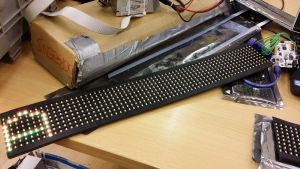LED Flexible Screen: Difference between revisions
From London Hackspace Wiki
(Created page with "{{EquipmentInfobox |name=LED Flexible Screens <!-- Name of the item. --> |image=FlexibleLEDScreen.jpg<!-- Image of the item. Leave with placeholder image if none exists. --> |...") |
No edit summary |
||
| Line 38: | Line 38: | ||
|17||Red(Colour 2) Data | |17||Red(Colour 2) Data | ||
|} | |} | ||
===Reverse engineering notes=== | |||
* There is a row of 595 shift registers, one row for each colour | |||
* The pins your interested are the shift reg pins, and A B C, | |||
* ABC is a binary coded decimal notation for row selection | |||
* You then multiplex over the rows | |||
* The two banks of shift regs share a clock and latch, and have two separate data inputs. So you have to input two streams of data at the same time using the same clock/latch | |||
* Its just one (two) sets of shift registers, with three pins to select which row you want to light | |||
* If you want to do both colours though, you can't use arduino's shiftOut function | |||
Latest revision as of 02:53, 25 February 2014
| LED Flexible Screens | |
|---|---|
 | |
| Model | Unknown |
| Status | Reverse Engineered |
| Accessories | Power Supplies, Controllers |
| Training link | Unknown |
| Owner | Unknown |
| Origin | Unknown |
| Pin | Desc |
| 1-4 | 5v+ |
| 5 | NC |
| 6-9 | Ground |
| 10 | Green(Colour 1) Data |
| 11 | Clock |
| 12 | Latch |
| 13 | Row bit 1 |
| 14 | Row bit 2 |
| 15 | Row bit 3 |
| 16 | Output Enable |
| 17 | Red(Colour 2) Data |
Reverse engineering notes
- There is a row of 595 shift registers, one row for each colour
- The pins your interested are the shift reg pins, and A B C,
- ABC is a binary coded decimal notation for row selection
- You then multiplex over the rows
- The two banks of shift regs share a clock and latch, and have two separate data inputs. So you have to input two streams of data at the same time using the same clock/latch
- Its just one (two) sets of shift registers, with three pins to select which row you want to light
- If you want to do both colours though, you can't use arduino's shiftOut function